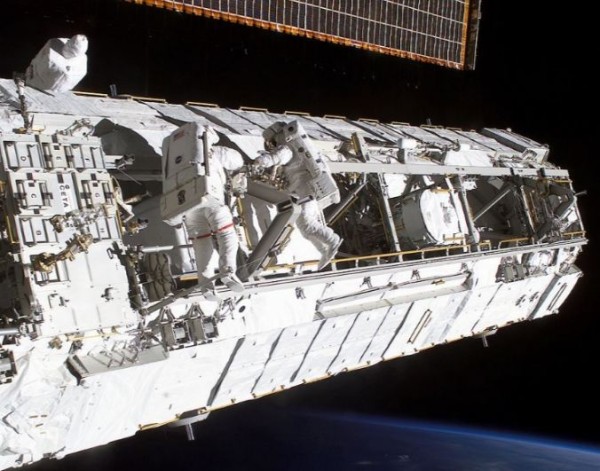An American and French astronaut took a spacewalk on Jan. 13 to complete the installation of modern and lighter Lithium-Ion (Li-Ion) battery packs that will provide the International Space Station (ISS) with more reliable power.
NASA astronaut and ISS commander Shane Kimbrough and French astronaut Thomas Pesquet of the European Space Agency took their EVA (extra vehicular activity) or spacewalk at 1122 GMT (6:22 a.m. EST), and finished their job in 3.5 hours, which was 40 minutes ahead of schedule. It was Pesquet's first spacewalk.
The mission, EVA-39, was the second and final spacewalk for the ISS' power upgrade process. The work began in December when a Canadian robotic arm called "Dextre" relocated the new Li-Ion batteries from the HTV-6 cargo spacecraft and placed them into their slots in the Integrated Electronics Assembly (IEA), where the astronauts could then connect them to the power grid.
The robotic work meant the astronauts didn't need to move the heavy batteries around themselves, which meant less time spent on the spacewalks.
NASA decided to modernize the ISS' batteries by using the more modern Lithium-Ion (Li-Ion) batteries. These battery types work via lithium ions moving between electrodes during the charging process, rather than pressurized hydrogen gas as used in Ni-H2 batteries.
As a result, Li-Ion batteries are much lighter and smaller than Ni-H2 batteries since they don't require pressure vessel containers for the storage of hydrogen gas, meaning Li-Ion batteries have very high energy density compared to Ni-H2 batteries.
This has many benefits to the ISS program. Just a single Li-Ion battery can replace the function of two of the previous Ni-H2 batteries. This, in turn, means that only half the number of Li-Ion batteries (24) are needed to replace all of the station's Ni-H2 batteries (48), which also halves the number of launches required.
Li-Ion batteries are also not susceptible to battery memory, negating the need for battery conditioning to be performed. Li-Ion batteries do have some drawbacks however, namely the fact that they are much more sensitive to overcharging, which must be prevented via battery management and protection systems.


